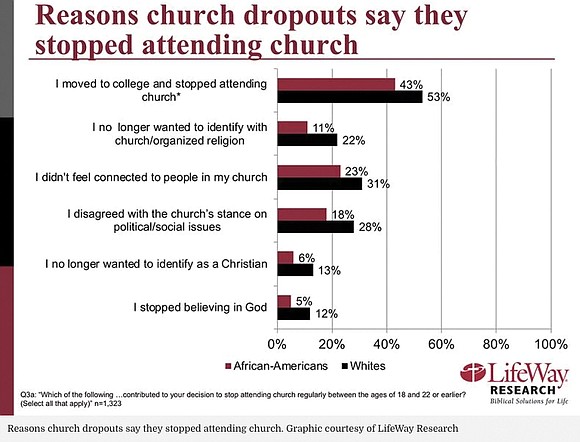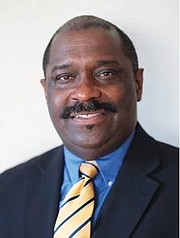African-American millennials more likely to skip church than white counterparts
By Adelle M. Banks/Religion News Service | 3/29/2019, 6 a.m.
African-American young adults are more likely than their Caucasian counterparts to drop out of Protestant churches during their early adult years, new research shows.
But equal percentages of black and white young adults say they currently attend services regularly.
A new analysis of survey data released March 13 by LifeWay Research of Nashville, Tenn., found that nearly three-quarters of black young adults said they stopped attending church regularly for at least a year between the ages of 18 and 22. By comparison, 65 percent of white young adults said they halted regular attendance during that period.
But 44 percent of white and black young adults who attended church regularly for more than a year in high school said they currently attended church at least twice a month. A quarter of white young adults said they did not currently attend church, compared to 19 percent of African-American young adults.
The survey, which was conducted in 2017, sampled the views of U.S. Protestant adults between the ages of 23 and 30.
Despite the early adult dropoff in attendance, a black church expert at LifeWay Christian Resources said many African-American students continue to feel they have a connection to a church they previously attended.
“Very often in African-American culture, we’re really, really tied to what we would call our home church, the church you grew up in,” said Dr. Mark Croston, former pastor of East End Baptist Church in Suffolk, Va., who works for the publishing division of the Southern Baptist Convention. “And so for many of our students, as they would move away to college, they would in their minds still be holding onto their relationship with their church where they grew up.”
Dr. Croston, who earned his doctorate from Virginia Union University’s Samuel DeWitt Proctor School of Theology and was a former president of the Virginia Baptist State Convention, said the survey shows that churches that do not have an active young adult ministry should consider having one.
The father of two adult children who are millennials said both expressed how important finding a congregation with a young adult ministry was to them as they looked for a new church after moving away from home. His daughter, Dr. Croston said, gave up on one congregation because it no longer offered a vibrant group that focused on young people.
“These are her words: ‘They don’t have anything there for me anymore,’ ” he recalled.
For both black and white young adults, college attendance or a move far from the church they had been attending were key factors in their halt in regular churchgoing. Among other reasons were disagreements with a church’s stance on social or political issues, which was cited by 28 percent of white young adults and 18 percent of black young adults.
The analysis focused on the race of the individuals surveyed and not the racial makeup of the congregations they may have attended.
The survey found that 72 percent of African-American young adults said they spend regular time in private prayer, compared to 58 percent of white young adults. Forty-seven percent of black young adults said they regularly read the Bible privately, compared to 33 percent of white young adults.
“The fact that they were still engaged in the disciplines of the faith, prayer and Bible reading really says that something is really still going on in their lives,” Dr. Croston said.
The survey was sponsored by LifeWay Students, the arm of LifeWay Christian Resources focused on student ministry, and included only those who had attended a Protestant church twice a month or more for at least a year during high school.
The new analysis was based on a sample of 2,002 online interviews. The overall margin of error was plus or minus 2.4 percentage points.









